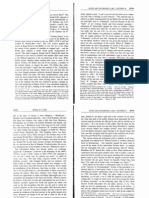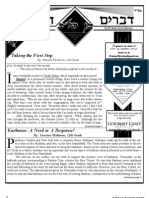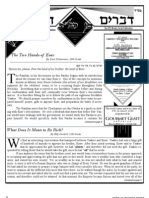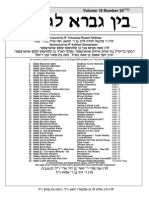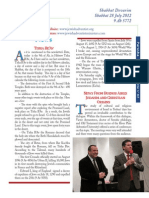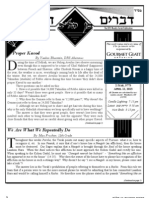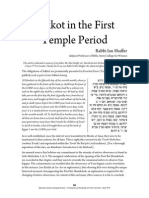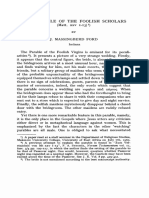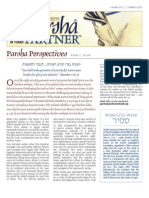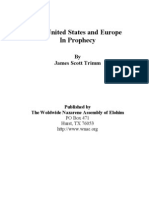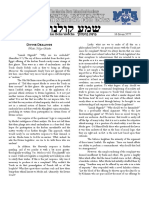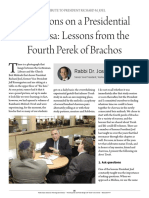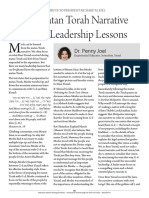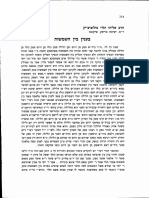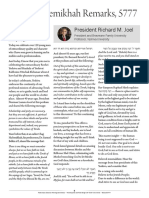An Enlightening Source: Shem: A Model of An Appreciative Son
An Enlightening Source: Shem: A Model of An Appreciative Son
Uploaded by
outdash2Copyright:
Available Formats
An Enlightening Source: Shem: A Model of An Appreciative Son
An Enlightening Source: Shem: A Model of An Appreciative Son
Uploaded by
outdash2Original Title
Copyright
Available Formats
Share this document
Did you find this document useful?
Is this content inappropriate?
Copyright:
Available Formats
An Enlightening Source: Shem: A Model of An Appreciative Son
An Enlightening Source: Shem: A Model of An Appreciative Son
Uploaded by
outdash2Copyright:
Available Formats
Dvarim Hayotzim Min Halev
~"ca
Volume XIV - Issue 2
The DRS Weekly Torah Publication
H
A
L
B
n
a
a
:
H
A
L
B
An Enlightening Source
By: Rabbi Moshe Erlbaum, 9th grade Rebbe
DR3\ D3"
To sponsor an issue of
a:n n nxin n:a~.
info@hayotzim.com email us at:
This weeks issue and every issue of
a:n n nxin n:a~
is sponsored by
GourmetGlatt.com 516-569-2662
T
owards the end of 9th Perek, the passukim describe how after Noach builds a vineyard, he becomes drunk from
the wine and undresses himself in his tent. Cham sees this and runs to his brothers to tell them what their father
has done. Shem and Yafet run to cover up their father with a garment to prevent any further embarrassment from
this debacle.
The wording of the passuk describing Shem and Yafets responses is, Vayikach Shem vYafet es hasimla vayasimu
vchulei. The grammar of the passuk is difficult. Why does the passuk use the word Vayikach in the singular verse, if
both Shem and Yafet are working together; the word should be in the plural verse, Vayikchu? Rashi gives a simple an-
swer: Shem exerted the fullest effort to perform the commandment of Kibud Av, whereas his brother Yafet didnt put in
as much effort, and therefore the verb of the passuk focuses on Shem. Accordingly, the children of Shem are rewarded
with the mitzvot of tzitzis and techeiles, and the descendants of Yafet receive the benefit of being buried after the war of
Gog, the future generations of Yafet, and Magog.
Rav Yosef Dov Solovetichik offers an alternative answer to the question. The Rav quotes the Medrash in
Bereishis Rabbah that Yafet listened to Shem but did not act, so thats why the passuk says Vayikach in the singular
(Continued on page 4)
A
fascinating insight into the parsha occurred to me on a family trip this sum-
mer to Mystic Seaport, Connecticut. In one of the exhibits, the seaport is
restoring the Charles W. Morgan, a whaling ship built in 1841. As my fami-
ly and I boarded the ship I noticed that within the wood boards that com-
prised most of the deck, were glass-like hexagons. They piqued my curiosity and I
found a guide on the ship to ask him what they are. He answered me that these glass
hexagons are actually deck prisms that were above the officer cabins on the lower deck.
When the light from the sun enters the prism on the deck the light will shine throughout
the officers room on the lower deck. He then showed me some of these deck prisms
and I noticed that they were cut exactly like diamonds or other precious stones. Immedi-
ately, a Rashi in Parshas Noach came to mind.
Hashem commands Noach Tzohar taaseh lateiva - A tzohar you should
make for the ark. (6:16) Rashi offers two explanations as to what this tzohar may be.
Some say it was a window (skylight) and some say a precious stone that will give
light. Each explanation has an obvious difficulty. If Noach was to build a window, the
rain of the mabul will enter the ark. In addition, how can a precious stone illuminate the
ark? However, based on the deck prisms found on the Charles W. Morgan whaling ship,
I would like to suggest that both explanations of Rashi are simultaneously correct and
(Continued on page 2)
Shem: A Model of an Appreciative Son
By: Ariel Axelrod, 11th grade
PARSHAS NOACH
4 CHESHVAN, 5773
OCTOBER 19, 2012
All Zmanim are calculated by myzmanim.com for
Woodmere, NY (11598)
Candle Lighting: 5:49 pm
Latest : 9:55 am
Ends: 6:48 pm
2
make perfect sense. Hashem commanded Noach to cut out on top of
the ark a window. In the window will be placed a prism shaped pre-
cious stone. Aside from keeping out the rain, when the light from the
outside will shine into the stone, its prism will refract and disperse
natural light into the space below. This relatively small opening will
also not weaken the planks used to build the ark and they will still
withstand the heavy rains of the mabul. What emerges is
a fascinating idea. This source of light innovated by Noach as di-
rected by Hashem, was passed on and became the standard way that
ancient ships provided light to the cabins on the lower deck.
(Rabbi Erlbaum Continued from page 1)
Torah Teasers
By Rabbi Moshe Erlbaum
Questions
1. Where else in the Torah was someone
saved from harm by being situated in a
" "?
2. Which is given personally to both
and ?
3. Which part of the body mentioned in the
is also the name of a city?
4. is described as an " ", a
righteous complete man (:(. What other
description of includes the term " "?
5. A descendent of and a descendant of
were known by the same name. What was
the name?
6. Which grandfather and grandson have the
same name?
Answers
1. In , baby is placed into a
" " by his mother to save him from being
thrown into the Nile river by the Egyptians
): ).
2. and are both given the of "
", to be fruitful and multiply (: ,:).
3. The (shoulder) is mentioned when
and carry the blanket on their shoulders
from behind to cover . ):(. is also a
name of a city that first appears in
):(.
4. is called an " ", a man of the
earth ):).
5. is the name of a grandson of ):(
and a descendent of ):(.
6. has a son who has a son also
named ),:(.
The complete edition of
Rabbi Moshe Erlbaums Torah
Teasers
is now available on AMAZON
(keyword Torah Teasers)
to the ground, swiftly bent down, plucked up the coin and ran off.
Yitzele lay in the street, stunned. By the time he got up, the culprit
had long since disappeared over a fence, and Yitzele knew it
would be hopeless -- perhaps even dangerous -- for a Jew to chase
an Arab in that neighborhood.
Late that afternoon a dejected Yitzele made his way back
to the shul of the Chernobyler Rebbe, Rabbi Nachum Twersky
(1840-1936), where his father prayed Minchah and ate shalosh
seudos. Yitzele usually helped set up the chairs and tables and put
out the food for the men who sat down to eat with the Rebbe, but
today he sat in a corner by himself.
The Rebbe, who loved little Yitzele, realized that some-
thing was amiss because the chairs and benches were in disarray.
He looked around for a moment and then saw Yitzele sitting in a
corner by himself, downcast. The Chernobyler Rebbe approached
the child and asked, "What's wrong? You look so unhappy. We all
need you at the table." Yitzele told the Rebbe what had happened
earlier that afternoon, and explained how he felt about the oppor-
tunity he had lost. The Rebbe listened intently, then, taking Yit-
zele by the hand, he said, "Come to the table with me now, and
after the Sabbath come into my house."
After Shabbos, Yitzele followed the Rebbe into his home
which was connected to the synagogue. The Rebbe opened a
drawer and removed from it a golden coin similar to the one Yit-
zele had seen near the Jaffa Gate that afternoon. "Here, this is
yours," said the Rebbe. "However, I am giving it to you on one
condition: that you give me the reward of the mitzvah that you did
this afternoon." The startled young child looked up at the Rebbe.
"The Rebbe wants the reward in exchange for the coin?"
"Yes," the Rebbe said. "You made a great Kiddush
Hashem by not picking up the money because it was Shabbos.
The coin is for you, though. I just want the reward." Yitzele was
astounded. Was the mitzvah that great? Was it really worth so
much? He looked at the coin and thought fleetingly about what it
could buy for his family. He looked up at the Rebbe and said, "If
that is what the mitzvah is worth, then the mitzvah is not for sale."
The Rebbe bent and kissed the boy on his forehead.
(Stories of GreatnessContinued from page 8)
Dvarim Hayotzim Min Halev 3
Tishrei 28
In 1930, the British government issued the Pass field White
Paper, a formal statement of policy in Palestine. The paper
was an attempt to appease the Arabs in the aftermath of the
1929 riots: During six days of Arab rioting in Jerusalem,
Gaza, Hebron and Tzfat, 135 Jews were killed and more
than 300 wounded. The White Paper criticized the Jewish
Agency for promoting Jewish employment opportunities,
claiming that it damaged economic development of the Ar-
ab population. Further, the paper required that Jews obtain
permission from the British authorities to purchase land.
The result was that Jewish immigration was greatly cur-
tailed.
Tishrei 29
Yahrtzeit of Rabbi Don Yitzhak Abrabanel (1437-1508), a
leader during the Golden Age of Spanish Jewry. After hav-
ing served as treasurer to the king of Portugal, Abrabanel
became a minister in the court of King Ferdinand and
Queen Isabella. In 1492, Isabella signed a decree expelling
all Jews who refused to convert to Christianity. In the Inqui-
sition, an estimated 32,000 Jews were burned at the stake
and another 200,000 were expelled from Spain. Rabbi Abra-
banel reportedly offered Queen Isabella the astronomical
sum of 600,000 crowns to revoke the edict. Abrabanel was
unable to prevent the expulsion and was exiled along with
his people. Most of his rabbinic writings were composed in
his later years when he was free of governmental responsi-
bilities.
Tishrei 30
In 1958, the foundation stone was laid for Israel's Knesset
building in Jerusalem. The Knesset is composed of 120
members, the same size as the Great Assembly ("Knesset
HaGedola") that served as the rabbinical body during the
Second Temple era. (The Great Assembly redacted the bib-
lical books Ezekiel, Daniel and Esther, and composed many
prayers such as the Amidah.) Today, the Israeli Knesset is
known as a bastion of democracy in the Middle East, with
women, Arabs, and other minorities represented.
Cheshvan 1
In 1985, ground-breaking ceremonies were held for the
United States Holocaust Memorial Museum in Washington
DC. Two milk cans containing soil and ashes from concen-
tration camps were symbolically buried on the site. The mu-
seum was dedicated in April 1993, with speeches by Presi-
dent Bill Clinton, Chaim Herzog and Elie Wiesel. The mu-
seum cost approximately $168 million to build, funded with
more than 200,000 private donations. The museum attracts
2 million visitors annually.
Cheshvan 2
Yahrtzeit of Rabbi Simcha Wasserman, a 20th century To-
rah sage and son of the illustrious Rabbi Elchanan Wasser-
man, who was martyred in the Holocaust. Rabbi Wasserman
and his wife had no children, but together they educated
tens of thousands of Jews in France, the U.S. and Israel.
After Rabbi Wasserman's death, his wife died 10 days later.
Rabbi Wasserman had a sixth sense about people; the story
is told of him looking to purchase a used car in Los Ange-
les. He went to check out one particular car, and asked the
owner if he could take it for a test drive. "How do I know
you're not going to steal it?" the man said. Rabbi Wasser-
man then asked if he could use the telephone for a minute.
He called the police and reported a stolen vehicle at that
very address. The police arrived, confirmed that the car was
indeed stolen, and arrested the man. "How did you know?"
the police asked Rabbi Wasserman. "Simple," he said.
"When I asked to take it for a test drive, he suspected that
I'd steal it. Only a thief thinks that way!"
Cheshvan 3
In the year 1290, the last of the 16,000 Jews expelled by
King Edward I left England. King Edward had banned usu-
ry and forced Jews over the age of seven to wear an identi-
fying badge. Some Jews managed to remain in England by
hiding their religious identity, but thousands were forced to
leave. (Years earlier, King Henry III had forced Jews to pay
half the value of their property in taxes, and ordered Jewish
worship in synagogue to be held quietly so that Christians
would not have to hear it.) Following the expulsion, Jews
0 2012
Taken from Aish.com
4
Noach is one of the most fascinating figures in the Torah, and is introduced as being a righteous man, fault-
less in his generation. The Torah does not use such language loosely; not even Avraham, Yitzchak, or Yaakov are
described this way. However, the last scene of his life depicts the opposite, a debased and embarrassed person. How
could such a great man have fallen so low?
A comment from Medrash Tanchuma on Noach offers a sharp perspective on his character. The Medrash
describing how Noach should have left the ark once the waters had abated, but he remained there, reasoning that
since he had entered the ark with Gods permission, so too he should exit with his permission. Then Rabbi Yehuda
Bar Ilai adds in: If I had been there I would have broken down the ark and let myself out. To understand this
Medrash, one must read the story of the mabul carefully. The story begins rapidly. God announces the imminent
destruction of life on earth. He orders Noach to build an ark. Details follow for what Noach must take with him.
The rain comes; the earth is flooded; Noach and those with him are the sole survivors. The water ceases and the
flood abates. We expect that Noach will immediately emerge. Instead the narrative slows. Fourteen days pass, as
Noach sends out a raven and two doves, one returns with an olive leaf, but it seems to have no effect on Noach. On-
ly with Gods actual command does Noach finally emerge. This Medrash seems to emphasize with an exasperated
tone that one does not simply wait for permission when rebuilding a shattered world.
What does Noach say to God when he learns that the world is about to perish? What does he say when the
rain begins to fall? Interestingly, the answer is nothing. During the entire sequence of events, all we read about is
Noachs silent obedience, as the Torah states, Noach did everything just as God had commanded him (6:22); he
brought pairs of animals into the ark as God had commanded Noach (7:9,16). Noach is the paradigm of biblical
obedience. What his story tells us is that pure obedience is not enough.
This is an extraordinary phenomenon. It is reasonable to assume that in a life of faith, obedience is the high-
est value. A strange feature of biblical Hebrew is that despite there being 613 mitzvos, there is no word for obey.
Instead, the Torah uses the word lishmoa, a term with no single definition, that can mean to listen, to understand,
to internalize. In Judaism, God doesnt command blind obedience. It is stated in the Gemara Ein Hakadosh Ba-
ruch Hu ba biturnya im beriyotav- God does not deal tyrannically with his creations. God wants us to be mature
and responsible to do his will because we understand, or because we trust him, even if we do not understand.
Intuitively, Chazal understood that the hero of faith was not Noach, but Avraham, who challenged God him-
self in an unrivaled manner. Rabbi Yehuda illustrates the contrast between Avaraham and Noach with their respec-
tive Pesukim: By Avraham God says Because you are wholehearted, walk before me, but Noach simply walked
with God (Bereshis Rabba, 30:10). Noachs end, as an embarrassment to his children, shows us that he could not
carry the guilt of his sole survival. It takes courage to rebuild a shattered world. This trait that Noach lacked was
exemplified by the founders of Israel and the Chassidic survivors of the Holocaust. Faith is more than obedience. It
takes the courage to create.
Adapted from Covenant and Conversation
Beyond Obedience
By: Hillel Field, 12th grade
verse. A second question is, what about Cham? What were the repercussions for him not aiding his father? The Rav
explains that from this story, it can be derived that Cham always looked for the faults of his father, something that is
not encouraged in a father-son relationship. This also shows the importance of kibud av vaim. One must realize that
everything he achieves and accomplishes is partially attributed to his father. Based on that, the rewards that Shem and
Yafet received for their swift actions of helping their father, are actually quite fitting. For Shem, the Gemara tells us
that Techeiles by Tzitzis is similar to the sea, and the sea to the sky, and the sky to the Kisei Hakavod. In the words of
the Rav, the same fear a person has to have for Hashem he must have for his father. Shem appreciated what his father
(Ariel AxelrodContinued from page 1)
(Continued on page 5)
Dvarim Hayotzim Min Halev 5
And Noach did all that HASHEM had commanded him,
and Noach was six hundred years old and the flood waters
were upon the earth. And Noach came and his sons and
wife and the wives of his sons with him into the Ark be-
cause of the waters of the flood. (Breishis 7:5-7)
Rashi on this Passuk comments: Even Noach was
from the small believers. He both believed and didnt be-
lieve that the flood would come, and therefore he didnt
enter the Ark until the waters forced him to do so.
Was Noach really a small believer? He didnt be-
lieve the waters of the flood would really come? How is
that possible?? He toiled for 120 years and exposed him-
self to extreme ridicule just to build that Ark that would be
used when there would be a flood?? The verse even says,
Noach did all that HASHEM had commanded him. How
could he be from the small believers?
A similar accusation is made about Sara when she
laughed within herself upon hearing that she would have
a child. Rashi similarly comments that Sara was rebuked
because her laughter revealed her disbelief. Sara didnt
believe? She prayed the length of her life for a child not-
withstanding that she knew that HASHEM has held me
back from bearing. It has to be that Sara did believe in the
power of Hashem and His ability to allow her to miracu-
lously have a child at her age.
The Chofetz Chaim points out that this faltering of
belief is a foreshadowing of a future time when good Jews
who have lived with the fervent hope that the Jewish Peo-
ple will again be returned to Eretz Yisroel with the coming
of Mashiach, will confront the realization of their dreams.
So many of us repeat and sing those words of the 13 Fun-
damental Principles of Judaism, I believe with a perfect
belief in the coming of the Mashiach, and although he tar-
ries, even still I await his arrival each day!
What will that good hearted loyal Jew think when
he realizes his long awaited prayers for mashiach have
been fulfilled? A good portion of him would probably be
in total disbelief, denying it strongly as just some sort of
joke or trick. Even after confirming the truth he still cannot
believe it. Although he anticipated it on some level another
part of him cannot process the actual paradigm and this
miraculous shift.
This idea begs the question though; how can one
believe and not believe simultaneously? A good way to
answer this is with a story. Reb Chaim from Sanz posed a
question to one of his Chassidim as he passed by. What
would you do if you found a wallet with a significant
amount of money in it and there were clear identifiable
signs for the owner to reclaim it? The man said in all sin-
cerity, Why Rebbe, I would return it! The Rebbe ex-
claimed, Foolishness! The next gentleman was asked the
same question about the wallet to which he responded,
Rebbe, I would keep it! Ganav-Thief! the Rebbe pro-
claimed. A third man on the street when asked about the
wallet and, most honest of all, answered, I dont know
what I would do, Rebbe, but I hope I would have the moral
resolve to do the right thing and return it to the rightful
owner! Ahhhhh!!, sighed the Rebbe from Sanz, This is
a wise man!
We cant know for sure what we will do when the
unexpected surprises of life are thrown at us. What we can
do is prepare for whatever may happen through Torah
study and prayer and work on ourselves to make sure we
make the correct and moral choice when the proper time
comes.
had done for him, and now, he is in some sense repaying Noach by saving him embarrassment. For Yafet, the reward
or honor of a proper burial at the end of days is also quite fitting according to the Ravs explanation. As Chazal say in
Maseches Megila, yafyuso shel Yafet, Yafet always looked for what was nice, not for what was right or wrong. Cov-
ering Noach didnt violate Yafets aesthetic sense so he went along with it. Really, it was only Shems singular ac-
tion in bestowing appreciation upon his father by impeding embarrassment upon him because Yafet was just there to
listen to him. May we all follow after Shem and appreciate all our parents efforts for us by bestowing kindness upon
them.
(Ariel AxelrodContinued from page 4)
By: Yossi Goldschein, 12th grade
The Power of
Believing
6
In this weeks parsha, the Torah tells us about one of
the most famous events in all of history, the mabul (The
Flood). The Torah tells us that Hashem could no longer toler-
ate mankind because of their sins. The Midrash teaches that
the reason why Hashem could not tolerate us any more was
because the nation committed the three cardinal sins: idolatry,
immorality, and bloodshed. Once they started committing the
sin of theft, Hashem could no longer tolerate them and had to
bring a flood. Many scholars have wondered why the story of
the mabul needed to be written in the Torah. What practical
lessons can one derive from the story of the mabul that cant
be learned from another event that had taken place in history?
There are entire chapters of the Torah devoted to the story of
the mabul, and they seem to be extra and unnecessary. Our
rabbis teach us that there is not even an extra letter in the
whole Torah.
We already know that one shouldnt commit the sins
of immorality, idolatry, bloodshed, and theft because the Ten
Commandments state explicitly that we shouldnt do these
sins. It seems that the purpose of the mabul being in the Torah
is to teach us about the evils of these sins. If so, then the ma-
buls lesson seems to be just repeating whats already written
in the Ten Commandments. If this is true, then what is the
deeper significance of the story of the mabul, and what lessons
can we derive from it that we can apply to our lives today?
The Torah teaches us that the generation of the flood
was very unique. Hashem had blessed them with all sorts of
physical blessings such as extremely long lives, great height,
and a constant climate that was always the same mild spring
weather. Furthermore, they had to only work the land every
forty years and it then produced enough food for the following
forty years. After receiving all of these great miracles they re-
belled against Hashem and said We have everything we need,
why do we need to serve our creator? They accredited their
prosperity to their own might and strength. In their material
abundance, they forgot about Hashem and turned away from
Him. The lesson that needs to be learned and understood is
that we shouldnt forsake Hashem when we are prosperous,
and only cry out to him when things dont go perfectly. We
have to learn from the mistakes of the generation of the mabul,
and we have realize that although we are experiencing a time
of great material abundance, we must not forget Hashem, the
one who is providing us with this abundance.
The Parsha starts with the Pasuk ,
-- : , -
, - . Immediately, all the
commentators ask: why is the name Noach dou-
bled? Maran Tzvi Elimelech of Dinev (who is best
known for his sefer, the Bnei Yissachar) also asks
in his sefer, the Igrei Dekala: Why does the pasuk
start by mentioning the toldot of Noach and fin-
ish by mentioning his praise?
He answers based on two teachings of
Chazal. One, Hashem helps all parents to give
their child a name that matches their neshamah;
and the main essence of the name is the fact that it
represents the neshamah. Two, in Baba Metziah
33 we learn that the honor of a rebbe is greater
than the honor of a father in terms of returning lost
objects and redeeming from captivity. This is be-
cause the father brought the son into this world,
but the rebbe will bring the son into the world to
come. Therefore, the reward of the rebbe is great-
er, as he shares in all of the learning of his talmi-
dim. This is evident from a story in Yevamos 96b,
where the rabbis told R Yochanan that all of his
torah was from R Eliezer his teacher.
Now we could answer our question about
Noach. Noach had no rebbe (see the Ohr Hachaim
Hakadosh on pasuk tes, where he explains that if
his whole generation were reshaim, then he could
obviously not have a rebbe) and therefore was
forced to do everything by himself, even to learn
to be able to become a tzaddik (as he is called in
the pasuk). So it actually comes out as if he was
his own parent, and even though Lemech (his fa-
ther) chose his name (5:29), Noach is the one who
actually fulfilled the main part of his name: the
part that represents his neshama. Thus the se-
quence in the pasuk , - the child of
Noach is Noach himself, because he had no teach-
er. This is reaffirmed in the end of the pasuk: -
, - meaning that Hashem walked
with Noach- alone without the help of a rebbe.
The answer to the second question is that mention-
ing his children is his praise, because he is equated
with his own father, and he did very well with
himself.
The Power of a Name
By: Uri Himelstein, 11th grade
The Lessons of the Mabul
By: Brian Chernigoff , 9th grade
Dvarim Hayotzim Min Halev 7
Rav Yissocher Frand relates the following idea
in the name of Rav Shimon Schwab in his sefer, Rav
Schwab Makes an Assumption: If even the highest of
mountains were covered in water and the whole world
was submerged during the flood, according to the laws
of nature, it should have taken years for all the water to
evaporate and recede. It is nothing short of a miracle
that all of the water receded in a period of several
weeks, as we learn in Parshat Noach.
However, if we know that Hashem removed
hundreds of millions of gallons of water through a mira-
cle, why couldnt Hashem have made it take a much
shorter amount of time? Noach needed to send out a
raven, a dove, wait week after week, and then finally
exit the Taivah when the dove didnt come back. But if
Hashem was making a miracle already, why didnt He
spare Noach the time and allow him to come to dry land
earlier?
Rav Schwab suggests that the Torah is teaching
us a very important lesson. Nowadays, whenever we
want something, it must always be done right away.
When we need to send a message to someone, it can
reach them in a matter of seconds through text message
or e-mail. When we need to warm up food, we put it in
would not return to England for 350 years, when the
policy was reversed by Oliver Cromwell in 1655.
Cheshvan 4
In 1483, Tomas de Torquemada was appointed as
"Grand Inquisitor of the Spanish Inquisition." Jews of
Spain had been forced to convert to Christianity, and the
Inquisition was designed to uncover those who were
continuing to practice their Judaism in secret (called
Conversos or Marranos). Those who never confessed
were burned at the stake; those who did confess were
strangled first. Torquemada believed that as long as the
Jews remained in Spain, they might influence the tens
of thousands of Jews who had converted to Christianity.
It was on his recommendation that the remainder of the
Jewish community -- 200,000 people -- was expelled
from Spain in 1492. An estimated 32,000 were burned
at the stake, and Torquemada's name became a byword
for cruelty and fanaticism in the service of religion. The
order of expulsion was not officially voided by the gov-
ernment of Spain until 1968.
Cheshvan 5
In 1975, Israel signed the Sinai disengagement pact with
Egypt. The agreement called for Israel to withdraw from
the Sinai passes captured in the 1973 Yom Kippur War,
leaving them as a demilitarized zone monitored by
American and United Nations observers. Israel had pre-
viously withdrawn from the Sinai in 1956, and would
eventually withdraw permanently in 1982 following the
Camp David agreement between Anwar Sadat and Men-
achem Begin.
(This Week in Jewish History Continued from page 3)
the microwave for a mere 30 seconds, and then it is warm. We dont have the patience to wait for anything, but
God wants us to be patient when waiting for His salvation. As the Gemara in Berachos 55a states: one who
prays to God and then investigates to see whether his prayers have been immediately answered is destined to be
disappointed. Prayers are not answered instantaneously. This is emphasized by Noach. As the pasuk says about
Noach: And he waited seven more days (8:10). Two pessukim later, the Torah says again, And he waited
seven more days (8:12)
At the end of Parshat Shemot, after Moshe asked Pharaoh to let Bnai Yisrael go, Moshe complained to
Hashem, claiming that the last encounter just made matters worse. Hashem responded to Moshe saying, Now
you will see what I will do to Pharaoh (6:1). The Gemara (Sanhedrin 111a) elaborates, Now you will see
what I will do to Pharaoh, but you will not see what I will do to the 31 kings when Israel enters the land of Ca-
naan. This was Moshes punishment, midah knegged midah. Since Moshe wrongly demanded instant help
from Hashem, Moshe was not present for the 14 years it took to settle in Eretz Yisrael, which did not happen in
an instant it happened very gradually.
After the Yamim Noraim, some might feel that Hashem has answered the tefillot which they prayed so
intently. One might expect to solve all his problems quickly, however, just like Noach, we must be patient and
realize that not everything will come instantaneously.
Miracles Take Time
By: Daniel Aharon, 10th grade
8
The DRS Yeshiva High School For Boys
700 Ibsen Street, Woodmere, NY 11598
Phone: (516) 295-7700 - Fax: (516) 295-4790
a:n n nxin n:a~
Weekly Torah Publication of the DRS Yeshiva High School
If you have any comments, questions, or suggestions,
feel free to email us at info@hayotzim.com
STORIES OF GREATNESS
TOLD OVER BY: DAVID LAUER
PUBLICATION
STAFF
Editors in Chief
Yitzie Scheinman
Benjamin Watman
Associate Editors
Eli Alter
layout editor
Elly Deutsch
Josh Fagin
rabbinic articles
Yoni Kadish
Shmulie Reichman
Jeremy Teichman
student articles
Production Staff
Jeremy Bienenfeld
director of production
Zach Kirschner
Moshe Spirn
Avi Weingarten
Judah Willig
production staff
/Authors
Daniel Aharon
Benny Aivazi
Ariel Axelrod
Eli Borochov
Brian Chernigoff
Hillel Field
Max Fruchter
Yossi Goldschein
Yaakov Hagler
Aryeh Helfgott
Uri Himelstein
Yehuda Inslicht
Zack Kalatsky
Noam Levy
Eitan Lipsky
Moshe Lonner
Benjamin Ramras
Moishy Rothman
Aaron Rubel
Yigal Saperstein
Alex Selesny
Donny Steinberg
Meir Sternberg
Maggid of DRS
David Lauer
Menahel
Rabbi Y. Kaminetsky
Faculty Advisors
Rabbi E. Brazil
Rabbi M. Erlbaum
Rabbi A. Lebowitz
As this years Maggid, I would like to
share inspirational stories of on a wide variety
of topics. If you have any suggestions, Com-
ments or critiques, please feel free to email me
at Dalauer18@gmail.com. The following story
entitled Not For Sale was taken from In the
Footsteps of the Maggid by Rabbi Paysach
Krohn.
Youth is so impressionable that our
Talmudic sages state (Shabbos 21b; see Rashi)
that learning during childhood is significantly
superior to learning as an adult. This is so be-
cause knowledge acquired in the early years of
life is usually retained much longer, since it
was initially embedded in a fresh, vibrant
mind.
The following incident, which took
place about 70 years ago, is a case in point. It
involved Rabbi Yitzchak Eisenbach, then an
eight-year-old boy growing up in Jerusalem.
The incident left an indelible impression that
remained with him all his life. The story was
retold by his son Avraham, who lives in the
Givat Shaul section of Jerusalem.
Rabbi Yitzchak Eisenbach came from a
prominent, pious family. As a youth he was an
active, feisty little fellow who made the streets
and alleyways of Jerusalem his personal play-
ground.One Shabbos afternoon, Yitzele was
walking to the Kotel through the Jaffa gate, in
a section of the city which was densely inhabit-
ed by Arabs. As he walked through the narrow,
unpaved streets he passed numerous Arab-
owned cafes in which young and old folks
were milling around. Suddenly Yitzele noticed
a gold coin on the sidewalk. The value of the
coin was such that it could support a family the
size of his own for two weeks. The poverty in
his home was wrenching, and he was thrilled at
the prospect of being able to help his parents in
their struggle for their family's survival.
However, because it was Shabbos, he
would not pick up the golden coin. He immedi-
ately put his foot on the coin to hide it from
view, and decided to stand there until shabbos
ended, when he would take the coin home to
his family. For another child his age, the time
element might have posed a problem, but for
the determined Yitzele there would be no diffi-
culty, even though there were four hours left to
shabbos! After Yitzele had been standing im-
mobile in the Arab street for more than an
hour, an Arab teenager approached him and
asked, "Why don't you move on? Why are you
standing here like a statue?"
At first Yitzele didn't answer, but when
the larger and stronger boy persisted, he replied
innocently, "I have something under my foot
that I can't pick up because it is shabbos today.
I'm watching it this way, so that after shabbos I
can take..." Before the last words were out of
Yitzele's mouth, the Arab boy shoved Yitzele
(Continued on page 2)
You might also like
- The Zohar The Zohar Pritzker Edition Vol 5 Exodus 5 Pritzkernbsped 9780804762199 9780804782166 2003014884Document1,060 pagesThe Zohar The Zohar Pritzker Edition Vol 5 Exodus 5 Pritzkernbsped 9780804762199 9780804782166 2003014884RAFAEL MENDONÇA100% (4)
- Daniel C. Matt - The Zohar (The Zohar - Pritzker Edition) Vol 4 - Exodus. 4-Stanford University Press (2019)Document1,253 pagesDaniel C. Matt - The Zohar (The Zohar - Pritzker Edition) Vol 4 - Exodus. 4-Stanford University Press (2019)Swetta Agarrwal100% (1)
- The 2nd Degree Tracing Board Intresting PointsDocument4 pagesThe 2nd Degree Tracing Board Intresting PointsAlejandro GarciaNo ratings yet
- Pages From Nathan Kamenetsky - Making of A GodolDocument2 pagesPages From Nathan Kamenetsky - Making of A GodolHirshel Tzig100% (1)
- The Seven Beggars: & Other Kabbalistic Tales of Rebbe Nachman of BreslovFrom EverandThe Seven Beggars: & Other Kabbalistic Tales of Rebbe Nachman of BreslovNo ratings yet
- Lessons Learned From Conversion: Rabbi Zvi RommDocument5 pagesLessons Learned From Conversion: Rabbi Zvi Rommoutdash2No ratings yet
- The Wicked Gatherer: Volume XIV - Issue 23 The DRS Weekly Torah PublicationDocument12 pagesThe Wicked Gatherer: Volume XIV - Issue 23 The DRS Weekly Torah Publicationoutdash2No ratings yet
- BGLG 74 26 Shemini 5774Document40 pagesBGLG 74 26 Shemini 5774api-245650987No ratings yet
- Taking The First Step: Volume XIII - Issue 13 The DRS Weekly Torah PublicationDocument8 pagesTaking The First Step: Volume XIII - Issue 13 The DRS Weekly Torah Publicationoutdash2No ratings yet
- Looking To Improve: The Staff ofDocument8 pagesLooking To Improve: The Staff ofoutdash2No ratings yet
- UntitledDocument8 pagesUntitledoutdash2No ratings yet
- Tzadik in Business: Jaffa InstituteDocument10 pagesTzadik in Business: Jaffa Instituteoutdash2No ratings yet
- Daniel C. Matt - The Zohar (The Zohar - Pritzker Edition), Vol 5 - Exodus. 5-Stanford University Press (2019)Document1,373 pagesDaniel C. Matt - The Zohar (The Zohar - Pritzker Edition), Vol 5 - Exodus. 5-Stanford University Press (2019)Swetta Agarrwal100% (1)
- Mi'veid Mixac: Shabbos and Achdus: 2 Peas in A PodDocument8 pagesMi'veid Mixac: Shabbos and Achdus: 2 Peas in A Podoutdash2No ratings yet
- The Two Hands of Esav: Jaffa InstituteDocument8 pagesThe Two Hands of Esav: Jaffa Instituteoutdash2No ratings yet
- Toronto TorahDocument4 pagesToronto Torahoutdash2No ratings yet
- Who's Crying?: Parashat Nitzavim Elul 28 5775 September 12, 2015 Vol. 25 No. 1Document4 pagesWho's Crying?: Parashat Nitzavim Elul 28 5775 September 12, 2015 Vol. 25 No. 1outdash2No ratings yet
- BGLG 74 24 Vayikra 5774Document36 pagesBGLG 74 24 Vayikra 5774api-245650987No ratings yet
- Pengaruh Targum Dan Talmud Dalam Perjanjian Baru: Ps. Dr.C. Jozeph Paul Zhang, MTHDocument41 pagesPengaruh Targum Dan Talmud Dalam Perjanjian Baru: Ps. Dr.C. Jozeph Paul Zhang, MTHBoncel Silo CaleqNo ratings yet
- Different Backgrounds: Did Yaakov Really Lie?Document6 pagesDifferent Backgrounds: Did Yaakov Really Lie?outdash2No ratings yet
- The Rema - The Story of Rabbi Moshe Isserles - Shulman, Yaacov Dovid - New York, 1991 - New York - CIS Publishers - 9781560620914 - Anna's ArchiveDocument196 pagesThe Rema - The Story of Rabbi Moshe Isserles - Shulman, Yaacov Dovid - New York, 1991 - New York - CIS Publishers - 9781560620914 - Anna's ArchiveJon BentonNo ratings yet
- Ethics I ValueDocument21 pagesEthics I ValuemkigelNo ratings yet
- BGLG 73 19 Terumah 5773Document36 pagesBGLG 73 19 Terumah 5773api-245650987No ratings yet
- Tisha Be'Av: Shabbat Devarim Shabbat 28 July 2012 9 Ab 5772Document5 pagesTisha Be'Av: Shabbat Devarim Shabbat 28 July 2012 9 Ab 5772Paulo CardosoNo ratings yet
- The Zohar (The Zohar - Pritzker Edition) Vol 4 - Exodus - Daniel C - Matt - 4, Pritzker, 2019 - Stanford University Press - 9780804782159Document1,052 pagesThe Zohar (The Zohar - Pritzker Edition) Vol 4 - Exodus - Daniel C - Matt - 4, Pritzker, 2019 - Stanford University Press - 9780804782159Pi'erre EmadNo ratings yet
- The Light Within Our Darkness: Chanukah: The Holiday of FaithDocument8 pagesThe Light Within Our Darkness: Chanukah: The Holiday of Faithoutdash2No ratings yet
- Being Wise of Heart: Volume XIII - Issue 11 The DRS Weekly Torah PublicationDocument8 pagesBeing Wise of Heart: Volume XIII - Issue 11 The DRS Weekly Torah Publicationoutdash2No ratings yet
- UntitledDocument8 pagesUntitledoutdash2No ratings yet
- Proper Kavod: by Yaakov Bluestein, DRS AlumnusDocument8 pagesProper Kavod: by Yaakov Bluestein, DRS Alumnusoutdash2No ratings yet
- Elevating The Mundane: by Yehuda Fogel, 12th GradeDocument10 pagesElevating The Mundane: by Yehuda Fogel, 12th Gradeoutdash2No ratings yet
- A Vision of Redemption - Benjamin BurtonDocument80 pagesA Vision of Redemption - Benjamin BurtonIan VíctorNo ratings yet
- The Ten Martyrs: Dr. Deena S. RabinovichDocument9 pagesThe Ten Martyrs: Dr. Deena S. Rabinovichoutdash2No ratings yet
- Thankful For The Wars: by Jeremy Teichman, 12th Grade, Editor of Student ArticlesDocument6 pagesThankful For The Wars: by Jeremy Teichman, 12th Grade, Editor of Student Articlesoutdash2No ratings yet
- The Importance of Peace at Heart: by Brian Chernigoff, 10th GradeDocument10 pagesThe Importance of Peace at Heart: by Brian Chernigoff, 10th Gradeoutdash2No ratings yet
- RizhinDocument15 pagesRizhinHirshel TzigNo ratings yet
- Rov Torah PessachDocument138 pagesRov Torah Pessachapi-3844554100% (1)
- The Eternal FountainDocument290 pagesThe Eternal FountainLeandroMaia100% (1)
- The Story Behind The Esrog by Ari Z. Zivotofsky and Ari GreenspanDocument5 pagesThe Story Behind The Esrog by Ari Z. Zivotofsky and Ari GreenspanYaakov CantorNo ratings yet
- Sukkot in The First Temple Period: Rabbi Ian ShafferDocument6 pagesSukkot in The First Temple Period: Rabbi Ian Shafferoutdash2No ratings yet
- Likutei Ohr: Parshat NoachDocument2 pagesLikutei Ohr: Parshat Noachoutdash2No ratings yet
- Vedibarta Bam Sefer ShemotDocument163 pagesVedibarta Bam Sefer Shemotapi-3811809100% (3)
- When Bar Kohkba Ordered Lulavim : The Second Jewish Revolt and The Miracle of The LulavDocument3 pagesWhen Bar Kohkba Ordered Lulavim : The Second Jewish Revolt and The Miracle of The Lulavoutdash2No ratings yet
- 23508143the Son of The MessiahDocument78 pages23508143the Son of The MessiahSadek TaboubiNo ratings yet
- The Breslov HaggadahDocument260 pagesThe Breslov HaggadahTova100% (2)
- Scroll To Scroll-Pekudei-Vayikra2015Document31 pagesScroll To Scroll-Pekudei-Vayikra2015api-204785694No ratings yet
- Parable of The Foolish Scholars.307150034Document18 pagesParable of The Foolish Scholars.307150034htl1975No ratings yet
- Did Jew Know?: A Handy Primer on the Customs, Culture & Practice of the Chosen PeopleFrom EverandDid Jew Know?: A Handy Primer on the Customs, Culture & Practice of the Chosen PeopleRating: 4 out of 5 stars4/5 (1)
- Pesach I Slavery and The Pesach MiraclesDocument24 pagesPesach I Slavery and The Pesach Miraclesoutdash2No ratings yet
- Vayigash 56Document21 pagesVayigash 56CarudijanNo ratings yet
- Famine Stela Lichtheim Ancient Egyptian Literature Vol IIIDocument10 pagesFamine Stela Lichtheim Ancient Egyptian Literature Vol IIIbook1manNo ratings yet
- DR York - Are The Caucasians EdomitesDocument161 pagesDR York - Are The Caucasians EdomitesNWPUNo ratings yet
- FL 4f4fdf76de6edDocument2 pagesFL 4f4fdf76de6edshlomo01No ratings yet
- FL 4daaba0cc4eb3Document2 pagesFL 4daaba0cc4eb3shlomo01No ratings yet
- Israel Lost & FoundDocument44 pagesIsrael Lost & FoundAnonymous gdJiDH0% (1)
- Abraham Ben Samuel Cohen of Lask - WikipediaDocument1 pageAbraham Ben Samuel Cohen of Lask - WikipediaNyx Bella DarkNo ratings yet
- Us and EuropeDocument20 pagesUs and EuropeblouvalkNo ratings yet
- Dec 14 Shabbat AnnouncementsDocument4 pagesDec 14 Shabbat AnnouncementsgnswebNo ratings yet
- Parashas Beha'aloscha: 16 Sivan 5777Document4 pagesParashas Beha'aloscha: 16 Sivan 5777outdash2No ratings yet
- Flowers and Trees in Shul On Shavuot: Rabbi Ezra SchwartzDocument2 pagesFlowers and Trees in Shul On Shavuot: Rabbi Ezra Schwartzoutdash2No ratings yet
- Shavuot To-Go - 5777 Mrs Schechter - Qq4422a83lDocument2 pagesShavuot To-Go - 5777 Mrs Schechter - Qq4422a83loutdash2No ratings yet
- UntitledDocument12 pagesUntitledoutdash2No ratings yet
- UntitledDocument12 pagesUntitledoutdash2No ratings yet
- Reflections On A Presidential Chavrusa: Lessons From The Fourth Perek of BrachosDocument3 pagesReflections On A Presidential Chavrusa: Lessons From The Fourth Perek of Brachosoutdash2No ratings yet
- Chavrusa: Chag Hasemikhah ז"עשתDocument28 pagesChavrusa: Chag Hasemikhah ז"עשתoutdash2No ratings yet
- The Surrogate Challenge: Rabbi Eli BelizonDocument3 pagesThe Surrogate Challenge: Rabbi Eli Belizonoutdash2No ratings yet
- The Matan Torah Narrative and Its Leadership Lessons: Dr. Penny JoelDocument2 pagesThe Matan Torah Narrative and Its Leadership Lessons: Dr. Penny Joeloutdash2No ratings yet
- The Meaning of The Menorah: Complete Tanach)Document4 pagesThe Meaning of The Menorah: Complete Tanach)outdash2No ratings yet
- Performance of Mitzvos by Conversion Candidates: Rabbi Michoel ZylbermanDocument6 pagesPerformance of Mitzvos by Conversion Candidates: Rabbi Michoel Zylbermanoutdash2No ratings yet
- 879510Document14 pages879510outdash2No ratings yet
- Consent and Coercion at Sinai: Rabbi Dr. Jacob J. SchacterDocument3 pagesConsent and Coercion at Sinai: Rabbi Dr. Jacob J. Schacteroutdash2No ratings yet
- Lessons From Mount Sinai:: The Interplay Between Halacha and Humanity in The Gerus ProcessDocument3 pagesLessons From Mount Sinai:: The Interplay Between Halacha and Humanity in The Gerus Processoutdash2No ratings yet
- 879446Document5 pages879446outdash2No ratings yet
- The Power of Obligation: Joshua BlauDocument3 pagesThe Power of Obligation: Joshua Blauoutdash2No ratings yet
- What Happens in Heaven... Stays in Heaven: Rabbi Dr. Avery JoelDocument3 pagesWhat Happens in Heaven... Stays in Heaven: Rabbi Dr. Avery Joeloutdash2No ratings yet
- I Just Want To Drink My Tea: Mrs. Leah NagarpowersDocument2 pagesI Just Want To Drink My Tea: Mrs. Leah Nagarpowersoutdash2No ratings yet
- Chavrusa: Chag Hasemikhah ז"עשתDocument28 pagesChavrusa: Chag Hasemikhah ז"עשתoutdash2No ratings yet
- José Faur: Modern Judaism, Vol. 12, No. 1. (Feb., 1992), Pp. 23-37Document16 pagesJosé Faur: Modern Judaism, Vol. 12, No. 1. (Feb., 1992), Pp. 23-37outdash2No ratings yet
- Chag Hasemikhah Remarks, 5777: President Richard M. JoelDocument2 pagesChag Hasemikhah Remarks, 5777: President Richard M. Joeloutdash2No ratings yet
- Experiencing The Silence of Sinai: Rabbi Menachem PennerDocument3 pagesExperiencing The Silence of Sinai: Rabbi Menachem Penneroutdash2No ratings yet
- Yom Hamyeuchas: Rabbi Dr. Hillel DavisDocument1 pageYom Hamyeuchas: Rabbi Dr. Hillel Davisoutdash2No ratings yet
- Kabbalat Hatorah:A Tribute To President Richard & Dr. Esther JoelDocument2 pagesKabbalat Hatorah:A Tribute To President Richard & Dr. Esther Joeloutdash2No ratings yet
- Torah To-Go: President Richard M. JoelDocument52 pagesTorah To-Go: President Richard M. Joeloutdash2No ratings yet
- Nasso: To Receive Via Email VisitDocument1 pageNasso: To Receive Via Email Visitoutdash2No ratings yet
- Appreciating Moses' GreatnessDocument4 pagesAppreciating Moses' Greatnessoutdash2No ratings yet
- Why Israel Matters: Ramban and The Uniqueness of The Land of IsraelDocument5 pagesWhy Israel Matters: Ramban and The Uniqueness of The Land of Israeloutdash2No ratings yet
- A Blessed Life: Rabbi Yehoshua FassDocument3 pagesA Blessed Life: Rabbi Yehoshua Fassoutdash2No ratings yet



